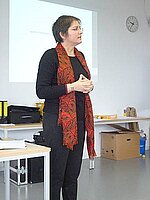Group 7
Comparative Group 7: Education for sustainable development in non-governmantal organisations: the roles of adult educators
Education for sustainable development, non-governmental organisations, adult educators
Education for sustainable development is based on a critique to development. At first, development was an idea that was central in social sciences as well as social and educational policies since the mid of the 20th century. Development was mainly directed at economic growth and sustained an influential modernization discourse. This understanding suffered strong criticism since the 1970’s. These critics focused on the exhaustion of natural resources, environmental threat and ecological crisis, among others.
Within this frame, after several events and the release of the Brundtland Report in 1987, sustainable development emerged as a new understanding of development, directed at stressing the need to reinforce an ethical behaviour and attitudes in what refers to nature preservation stressing the link among economy, technology, society and policy. Education has been considered a strong pillar of sustainable development.
Education for sustainable development has been developed by several organisations such as non-governmental ones (for instance CA3C in Italy, ADELPHI in Germany, Biosphere Expeditions and Bioregional Development Group ion the United Kingdom, Centre for Science and Environment in India, etc.). In these NGOs, projects and activities have been supported by transformative education guidelines that foster alternative models of producing and living, being these ecologically sustainable. Additionally, initiatives on sustainable development in line with a growing number of formal education programs have also been promoted by these NGO for instance in projects developed in cooperation between NGO and basic and secondary education schools and higher education institutions. Also, several programs directed at implementing social responsibility can be found in these NGO, being these funded by profit-making enterprises.
The implementation of such educational sustainable development projects and activities is supported by adult educators who develop several types of roles. Within projects and activities that are directed at transformative education guidelines that foster alternative models of producing and living, adult educators can have roles of social and environmental activists guiding intervention towards radical social change and critical education. In what refers to initiatives on sustainability within projects developed in cooperation of formal education institutions (such as school of basic and secondary education and higher education institutions), adult educators are in many circumstances teachers in formal and non-formal contexts concerned the degradation of the planet earth and aiming at changing students’ behaviors and attitudes that are respectful of ecological conservation, following for instance UN guidelines. In what concerns programs directed at implementing social responsibility funded by profit-making enterprises, adult educators’ often act as trainers informing people of the importance of having a social model of development including multiple dimensions that have to combine economic viability as well as ecological viability, trying to combine a more humanistic approach to learning and a more economistic approach to living in contemporary societies.
Comparative research question
1. Which policies of adult education for sustainable development can be found in different countries?
2. Which projects and activities of adult education for sustainable development can be found in NGO?
3. Which kind of roles are played by adult educators in projects and activities of education on sustainable development can be found in NGO?
Context of comparison
The contexts of comparison include concrete providers developing national policies as well as projects and activities of education for sustainable development. These projects and activities are provided by different organisations such as NGO various countries and are implemented by adult educators playing different kinds of roles.
Role of Practitioners
Practitioners should focus on national policies and strategies of education for sustainable development; analyse guidelines on education for sustainable development of projects and activities implemented by NGO; and explore roles of adult educators involved in education for sustainable development of projects and activities.
Categories of Comparison
(selection for the transnational essay is based on participants research interests)
1. Policies and strategies of education for sustainable development existing in specific countries.
2. Guidelines on education for sustainable development of projects and activities implemented by NGO.
3. Roles of adult educators involved in education for sustainable development of projects and activities.
References
Lima, L. C. (2011). Adult learning and civil society organisations: participation for transformation? In António Fragoso, Ewa Kurantowicz and Emilio Lucio-Villegas (eds.), Between Global and Local. Adult Learning and Development. Frankfurt am Main: Peter Lang, pp. 149-160.
Hart, G. (2001). Development critiques in the 1990s: culs de sac and promising paths. Progress in Human Geography, 24, 4, 649-658.
Tilbury, D., Stevenson, R. D., Fien, J. & Schrender, D. (eds.) (2002). Education and sustainability: Responding to the global challenge. Gland (Switzerland)/Cambridge (UK): Commission on Education and Communication/The World Conservation Union.

Prof. Paula Guimarães, Institute of Education, University of Lisbon, Portugal
Paula Guimarães is an assistant professor at the Instituto de Educação, Universidade de Lisboa since 2012. She did her PhD on Education Policies, in adult education, and has been studying adult education policies established, implemented and assessed at national and supranational levels. Her main interests have been the link that might be established among different levels of political intervention.

Co-moderation: Marta Gontarska, University of Lower Silesia, Poland
Marta Gontarska is a PhD candidate at the faculty of education, University of Lower Silesia in Wroclaw since 2018. She has 15 years of experience cooperating with civil society organizations on global education and education for sustainable development both on national and European level. Her current research interests include: non-formal and informal adult education, social learning, global citizenship, global education, national and European policies on development.


